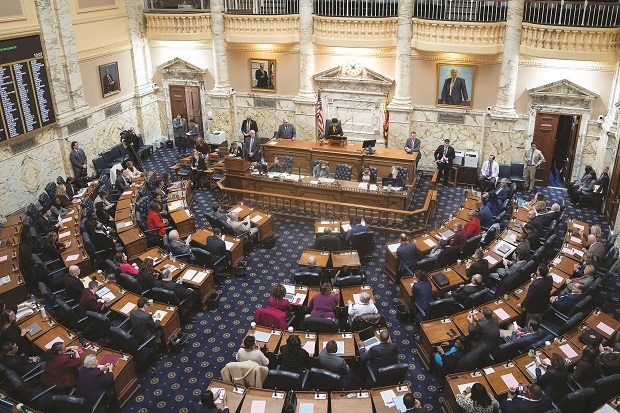After passing major family law legislation during the 2022 General Assembly session, family law-focused lawmakers did not pass reforms as comprehensive as those in 2024. (AP Photo/Bryan Woolston)
For the second consecutive year, bills codifying court standards for determining custody and the qualifications for court-appointed custody evaluators were passed this session of the General Assembly.
But a number of other family law bills made it through both chambers, including several bills related to vulnerable children and a bill that established a grant fund for the Domestic Violence Victims Program.
Following the passage of major family law legislation during the 2022 General Assembly session – with the passage of laws that raised the minimum age of marriage and prevented defendants from marrying witnesses to obtain their silence, to name a few – Family law open-minded lawmakers did not believe the reforms were comprehensive.
Sen. Chris West, R-Baltimore County and lead sponsor of SB 327, said his bill would have established the standards a judge considers in custody matters for the many people who come to court over a custody issue for themselves.

Attorney Michelle Smith, co-chair of the MSBA Legislative Committee and council member of the MSBA Family Law Section, says she hopes to hold discussions before the start of next year's General Assembly session to find a possible solution to legislation on custody standards She described it as a “perpetual reckoning.” (Submitted photo)
Custody standards legislation passed in the House of Representatives but failed in the Senate because opponents of the bill believed that joint custody of children should apply in divorce cases, West said.
But West said those two issues are separate issues.
“The criteria the judge should consider in deciding (which parent will get custody of the children) is independent of whether or not there should be a presumption of joint custody,” West said.
West said the bill's standards are neutral and he will reintroduce the bill next year in hopes of making it easier to pass the Senate.
SB 365, which specifies the qualifications and training that would be required of individuals to be appointed or certified by a court as a custody evaluator, also failed to gain full passage this legislative session.
As a co-sponsor of this bill, which is a companion bill to a 2022 measure introduced by West that would require judges presiding over custody cases to complete certain training, West said the bill's primary sponsors “would like the bill to be that way.” should be kept as simple as possible” and require exactly the same training for custody evaluators as that of judges.
Attorney Michelle Smith, co-chair of the MSBA Legislative Committee and council member of the MSBA Family Law Section, said she hopes to hold discussions before the start of next year's General Assembly session to find a possible solution to legislation on custody standards She described it as a “perpetual reckoning.”
“It hasn't been a particularly impactful year for family law given the legislation that's been passed,” said Smith, who is attending this year's General Assembly session with Annapolis-based Trainor, Billman, Bennett, Milko & Smith, LLP.
One exception, Smith said, is the passage of SB 439 by both chambers, which establishes the Domestic Violence Victims Program Grant Fund as a non-forfeiting fund within the Governor's Office of Crime, Prevention, Youth and Victim Services and authorizes the Governor to appropriate funding $5 million for the fund in the state's annual budget.
Sen. Sarah K. Elfreth, D-Anne Arundel Coun

“It's really important to have consistent, targeted funding for these (domestic violence) programs, especially now,” said Sen. Sarah K. Elfreth, D-Anne Arundel. (The Daily Record/Archive Photo)
Ty, the bill's lead sponsor, said state funding for domestic violence programs has always been critical and will only become more important post-COVID.
“It's really important to consistently and specifically fund these programs, especially now,” Elfreth said, noting that data shows reported domestic violence cases have increased significantly in recent years.
Elfreth said the bill's passage was a “really strong signal to the governor” that these programs deserve to be funded at $5 million a year to help provide emergency shelter resources to those responding to crisis calls and to compensate counselors and social workers.
“We ask (counselors and social workers) to support survivors in the harshest human conditions, and they deserve to be paid well and not feel like their future is at risk by working with the domestic violence program every fiscal year is if we do it.” “We don’t have consistent funding,” Elfreth said.
The bill still needs to be approved by Gov. Wes Moore.
Other family law bills passed in both chambers include HB 435, which authorizes a court to modify child support if a child support obligor is incarcerated, and registered HB 833, which creates a presumption that placement with a child's parent It is in the best interests of the child for the parent to receive treatment for a specific substance use disorder and for the child to receive appropriate care.
Looking back on this year's General Assembly session and what has been accomplished in recent years, West said he believes Maryland has comprehensive and uncontroversial family law laws in place.
“We're picking at the edges here to try to get things into a final form where everyone can agree,” West said. “We have extensive family law, both in statute and in court decisions. There is a broad consensus about what we need, and in fact we have everything we need.”


Comments are closed.